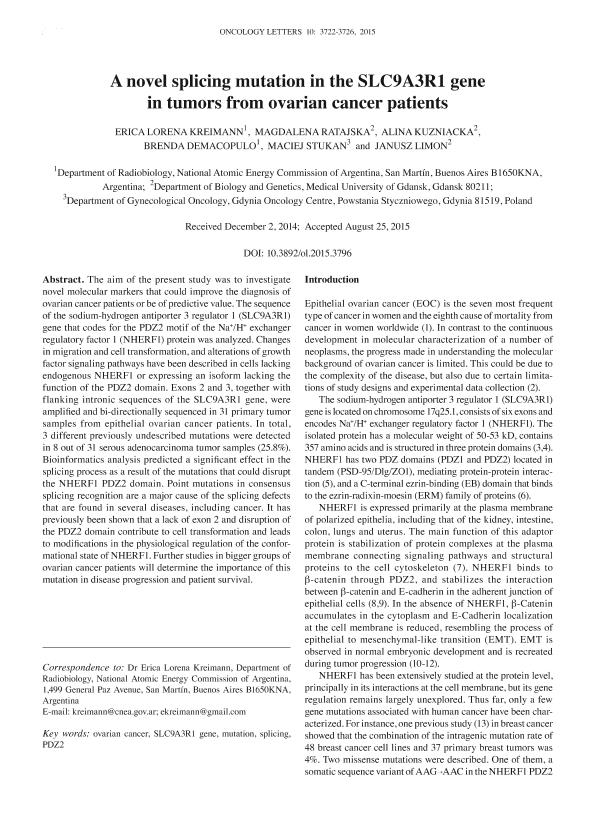Artículo
A novel splicing mutation in the SLC9A3R1 gene in tumors from ovarian cancer patients
Kreimann, Erica Lorena ; Ratajska, Magdalena; Kuzniacka, Alina; Demacopulo, Brenda
; Ratajska, Magdalena; Kuzniacka, Alina; Demacopulo, Brenda ; Stukan, Maciej; Limon, Janusz
; Stukan, Maciej; Limon, Janusz
 ; Ratajska, Magdalena; Kuzniacka, Alina; Demacopulo, Brenda
; Ratajska, Magdalena; Kuzniacka, Alina; Demacopulo, Brenda ; Stukan, Maciej; Limon, Janusz
; Stukan, Maciej; Limon, Janusz
Fecha de publicación:
12/2015
Editorial:
Spandidos Publications
Revista:
Oncology Letters
ISSN:
1792-1082
Idioma:
Inglés
Tipo de recurso:
Artículo publicado
Clasificación temática:
Resumen
The aim of the present study was to investigate novel molecular markers that could improve the diagnosis of ovarian cancer patients or be of predictive value. The sequence of the sodium‑hydrogen antiporter 3 regulator 1 (SLC9A3R1) gene that codes for the PDZ2 motif of the Na+/H+ exchanger regulatory factor 1 (NHERF1) protein was analyzed. Changes in migration and cell transformation, and alterations of growth factor signaling pathways have been described in cells lacking endogenous NHERF1 or expressing an isoform lacking the function of the PDZ2 domain. Exons 2 and 3, together with flanking intronic sequences of the SLC9A3R1 gene, were amplified and bi‑directionally sequenced in 31 primary tumor samples from epithelial ovarian cancer patients. In total, 3 different previously undescribed mutations were detected in 8 out of 31 serous adenocarcinoma tumor samples (25.8%). Bioinformatics analysis predicted a significant effect in the splicing process as a result of the mutations that could disrupt the NHERF1 PDZ2 domain. Point mutations in consensus splicing recognition are a major cause of the splicing defects that are found in several diseases, including cancer. It has previously been shown that a lack of exon 2 and disruption of the PDZ2 domain contribute to cell transformation and leads to modifications in the physiological regulation of the conformational state of NHERF1. Further studies in bigger groups of ovarian cancer patients will determine the importance of this mutation in disease progression and patient survival.
Palabras clave:
Mutation
,
Ovarian Cancer
,
Pdz2
,
Slc9a3r1 Gene
,
Splicing
Archivos asociados
Licencia
Identificadores
Colecciones
Articulos(SEDE CENTRAL)
Articulos de SEDE CENTRAL
Articulos de SEDE CENTRAL
Citación
Kreimann, Erica Lorena; Ratajska, Magdalena; Kuzniacka, Alina; Demacopulo, Brenda; Stukan, Maciej; et al.; A novel splicing mutation in the SLC9A3R1 gene in tumors from ovarian cancer patients; Spandidos Publications; Oncology Letters; 10; 6; 12-2015; 3722-3726
Compartir
Altmétricas



